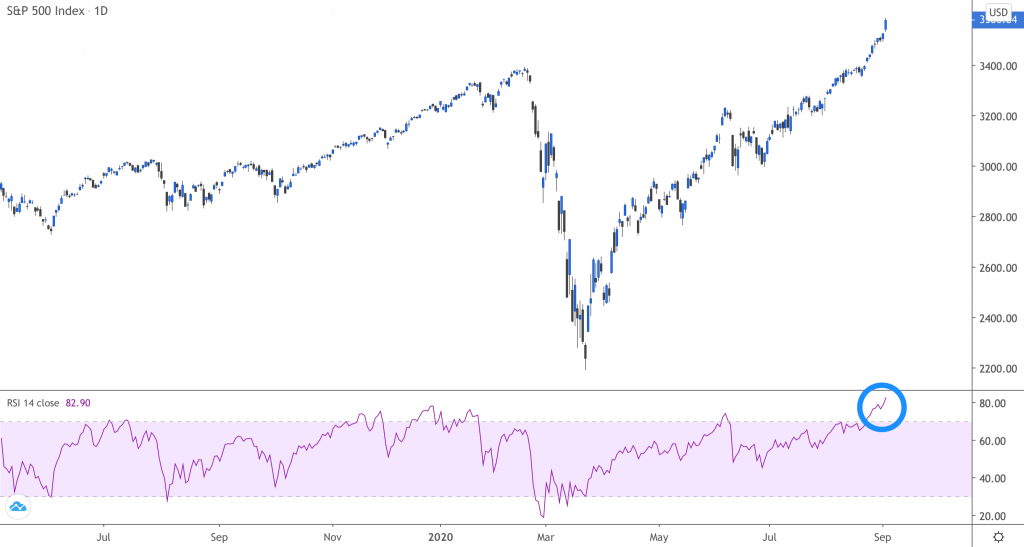The stock market could be in for a fall in the near-term. Here’s why.
Since the market bottom in March, stocks have been relentlessly climbing higher.
Both the S&P 500 and Nasdaq have surged to new record highs, and the Dow continues to claw its way into positive territory for the year.
But as the major indexes march higher, two experts are sounding the alarm that the market is due for a pullback.
“We’re overbought in the S&P 500 as an index in the short run,” said National Securities’ Art Hogan. “It moved higher really quickly.”
According to Hogan, the S&P 500’s relative strength index—or RSI—is flashing red.
“When [the RSI] sits around 50, you’re basically neutral,” Hogan said. “When it gets to 30, you’re oversold. And, when you get to 60 or 70, you’re overbought. We’re currently at about 75 on the S&P 500. So, we’re clearly overbought.”

In such an oversold state, Hogan warns the S&P 500 could be in for a 5% to 10% fall in the near term.
“Nothing draconian, but certainly an opportunity to say there’s a better buying opportunity in front of us if we still have cash on the sidelines,” Hogan said.
Economist Mohamed El-Erian echoed Hogan’s sentiment this week and said that action in the options market should be taken as a warning by retail investors who have been cashing in on the stock market’s rally over the last several months.
“The fear of missing out on an unceasing equity rally has increasingly been expressed through call options,” El-Erian said. “Those who would normally short the market on concerns of excessive valuations appear to have no desire to be steamrollered once again by favorable liquidity and the strong ‘buy-the-dip’ conditioning that comes with that.”
“The seemingly endless rally… gives the impression that prices are endorsed and supported by the entire professional investment community. After all, despite the vocal concerns over valuations having split away from underlying corporate and economic fundamentals, few fund managers have been willing to challenge the market by placing outright shorts,” El-Erian said.
El-Erian warned that retail investors should heed the cautiousness from “sophisticated investors.”
“It’s hard to overstate the extent of today’s risk-taking in U.S. financial markets,” El-Erian said, pointing to explosive moves higher in big tech stocks. “Much of this could be seen as market deepening were it not for one troubling face: corporate and economic fundamentals have yet to reflect a sustained and convincing recovery from COVID-related damage.”
“Rather than a well-thought-out bet on the future, stocks reflect many investors’ resolute faith in a consistently favorable and predictable liquidity environment. It is a backdrop anchored by reliable stimulus from central banks,” El-Erian added. “A large market correction, should one materialize, would encourage more professional selling that could overwhelm the buy-the-dip retail investor.”
El-Erian concluded, “It would take a big shock for markets to move significantly lower – such as a renewed start economic downturn, a considerable monetary or fiscal policy mistake, or market defaults and liquidity accidents. But should such a move occur, the likelihood of further market turmoil would be high, especially given the current lack of a short base to buffer the downturn. This exposes small retail investors to big potential losses.”